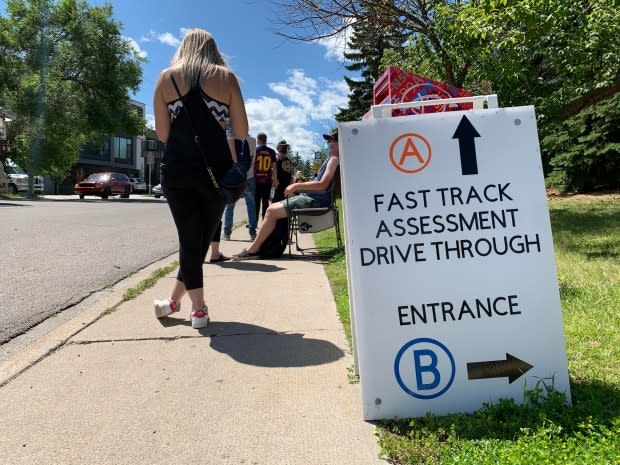AHS looks to quickly double COVID-19 testing capacity before September
Alberta Health Services is looking to the private sector to double its testing capacity and handle asymptomatic testing ahead of September.
AHS completes approximately 10,000 tests daily.
Chief Medical Officer of Health Dr. Deena Hinshaw said that ahead of September the province is looking at improving testing availability and turnaround in the coming months.
According to a Request for Expressions of Interest and Quotation (RFEOIQ) issued on Wednesday, AHS expects daily demand to rise to 22,000 tests — in part, due to the return to school plans.
This extra testing capacity could be used in airports, workplaces, remote and rural communities, centralized community collection stations as well as a "mobile and roving collection station." It would continue to be a public service but supply of tests, execution and lab services would be handed to the private sector.
"AHS wants to quickly source vendors to perform specimen collection (swabbing) and molecular testing (PCR) under contract to AHS," said AHS spokesperson James Wood. " AHS would maintain responsibility for "core testing" of symptomatic Albertans, close contacts of known cases, individuals in outbreak settings, and continuing care."
Wood said AHS is hoping to have proposals by Aug. 17 and will determine next steps after that.
Back to school testing strategy not finalized
In the document to vendors, AHS specifies the return to school testing strategy isn't finalized but given the number of students in Alberta, AHS and Alberta Precision Laboratories are exploring multiple marketplace avenues.
The document suggests back-to-school, and back to work, are behind the anticipated increase in demand.
In an update Thursday, Hinshaw suggested parents begin seeking testing in the coming weeks, especially for students who may have seasonal allergies or other conditions that may share COVID-19 symptoms.
"It's important before school to take them for a baseline test to ensure they have at least one negative result," Hinshaw said. "Parents know their children best so if that child has a change in their symptoms, that would be the time we need the child to stay home and get re-tested."
Dr. Lynora Saxinger, an infectious diseases specialist and an associate professor at the University of Alberta's faculty of medicine, said the move to engage the private sector makes sense, but she's wary.

"I can understand the rationale for it — I do have a few concerns," Saxinger said. "They mention it needs to be FDA approved if it's going to be done in the U.S. And I just know that there are quite a lot of tests that have been FDA approved that probably are not sufficiently high quality for use. That could provide misleading results."
Saxinger hopes existing expertise in Alberta's labs will validate any testing provider against what meets the current standards.
"You can't just open up the box and start using it. You have to compare it to your best local testing in a real-life fashion, and that's really important stuff," she said.
Testing strategy should be assessed
Saxinger said that while Alberta has a high testing rate, and testing does help in a pandemic, asymptomatic testing in the province could be more strategic. She said British Columbia's approach has been strategic and conducive to controlling the pandemic.
"There are diminishing returns at some point," she said. "Making sure that we have an overall testing strategy and philosophy in place and that we're evaluating it, reassessing it, would be a really useful thing to do."
AHS is looking to increase capacity alongside an existing partnership with pharmacies.
Karen Sullivan, the senior director of pharmacy professional affairs for Loblaw Companies Limited, says 43 of the chain's pharmacies are collecting samples and forwarding them for testing.
Pharmacies have been busy
Loblaw is working to bring all of its more than 200 locations online. She said if every pharmacy in Alberta participated in asymptomatic COVID-19 testing, there would be more than 1,300 testing locations.
"Pharmacists across the province have … stepped up to the plate and done a phenomenal job of venturing into something that has been a net new for them," Sullivan said.
Loblaw's busiest locations conduct 100 tests a day. Sullivan noted that among the participating pharmacies, Calgary has the highest testing rate.

